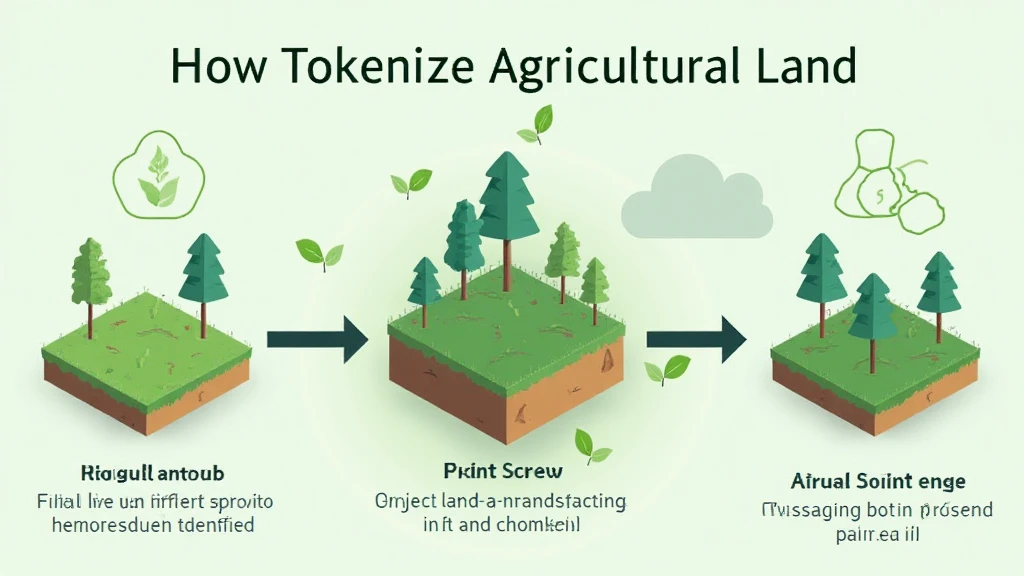How to Tokenize Agricultural Land: Transforming Real Estate Through Blockchain
As the agricultural industry continues to evolve, innovative solutions like tokenization are gaining traction. With the global agricultural land market valued at over $3 trillion, the potential for maximizing investments through blockchain technology is immense. Tokenizing agricultural land can enhance liquidity, increase transparency, and open new avenues for investment.
According to a study from Statista, the agricultural sector will face increasing pressures from population growth, climate change, and technological advancements. This presents a unique opportunity to leverage blockchain technology to address these challenges and enhance the market’s efficiency.
Understanding Tokenization
Before diving into the intricacies of how to tokenize agricultural land, it’s important to grasp what tokenization actually means. Tokenization is the process of converting ownership rights of a real-world asset into digital tokens on a blockchain. Each token represents a specific portion of the asset, enabling fractional ownership.

Imagine owning a portion of a vast agricultural estate just like owning shares in a company. This model improves accessibility for investors and increases liquidity for landowners.
The Benefits of Tokenization for Agricultural Land
- Increased Liquidity: Traditional agricultural land investments often involve significant costs and barriers to entry. Tokenization allows landowners to sell fractions of their property, attracting a broader range of investors.
- Transparency and Traceability: Utilizing a blockchain ledger, tokenization ensures that ownership records are secure, immutable, and easily verifiable.
- Global Participation: Tokenization facilitates international investments, allowing investors from diverse backgrounds to participate in the agricultural market.
- Enhanced Access to Funding: By attracting more investors, landowners can generate additional capital to improve and expand their agricultural practices.
Steps to Tokenize Agricultural Land
Now that we understand the benefits, let’s explore how to actually tokenize agricultural land.
Step 1: Conduct a Feasibility Study
Before proceeding with tokenization, it’s crucial to conduct a thorough feasibility study. Assess the land’s potential, zoning regulations, and market demand. This analysis will inform your decisions and the external evaluation of investors.
Step 2: Choose a Suitable Blockchain Platform
Select a blockchain platform that aligns with your project’s goals. Some popular options include Ethereum, Binance Smart Chain, and Hyperledger. Each platform has unique features and benefits that may impact your tokenization process.
Step 3: Create Digital Tokens
Once you have selected a suitable platform, it’s time to create digital tokens. This process typically involves smart contracts, which are self-executing contracts with terms directly written into code. Consider employing blockchain developers to ensure accurate implementations.
Step 4: Comply with Regulations
Tokenizing agricultural land requires compliance with local and international regulations. This includes securities law, land title regulations, and tax implications. Collaborating with legal experts will help you navigate these complexities.
Step 5: Launch and Market the Tokenized Asset
After creating tokens and ensuring compliance, it’s time to launch your project. Implement a marketing strategy to promote the investment opportunity effectively.
Local Insights: The Vietnamese Market
The Vietnamese agricultural sector is growing rapidly, with a 4.5% growth rate expected over the next five years, according to World Bank statistics. The increasing interest in technology-driven solutions in Vietnam—together with a growing middle class—creates promising conditions for agricultural land tokenization.
The Vietnamese government’s favorable stance towards blockchain applications further supports the potential for tokenization in agricultural lands. These developments signify a ripe opportunity for blockchain projects in the agriculture sector.
Potential Challenges in Tokenization
- Legal Uncertainty: As regulations surrounding blockchain and tokenization are still evolving, navigating these can be challenging.
- Market Acceptance: Gaining acceptance among traditional investors and landowners who may be skeptical of this novel approach.
- Technical Risks: Developing and maintaining a secure blockchain solution requires expertise and financial investment.
Conclusion
Tokenizing agricultural land represents a revolutionary shift in how investments in the agricultural sector are approached. By enhancing liquidity, transparency, and accessibility, this process could radically reshape the landscape of agricultural investment. As seen in Vietnam and other growing markets, the potential benefits are significant.
For those exploring how to tokenize agricultural land, it is essential to familiarize oneself with legal frameworks, technology requirements, and market dynamics to ensure successful implementation.
This innovation could lead to unprecedented growth and sustainability in agriculture, ultimately benefiting farmers, investors, and consumers alike. Embrace the future of agriculture—tokenize it!
For more insights into blockchain opportunities, visit bitcoincashblender.












